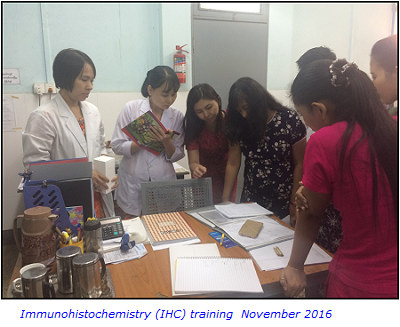Childhood cancer in Myanmar (Burma)
Childhood cancer in Myanmar: the story so far
Nearly 3,000 children in Myanmar are expected to develop cancer each year. There are two centres that can provide treatment; Yangon Children’s Hospital and Mandalay Children’s Hospital. However, due to a lack of awareness about childhood cancer among the public and healthcare professionals, an inability to accurately diagnose cases and the absence of funding for treatment-related costs, the number of newly diagnosed cases is far lower than expected. In addition to this, many families take their children home early before finishing treatment because of the financial burden related to long stays in hospital.
The main problems Myanmar faces with childhood cancer:
· Little or no specialist training for healthcare professionals
· Poor diagnostic facilities
· Late diagnosis of children presenting with an advanced stage of disease
· Limited psycho-social care for patients’ families or staff
Improvements that can be made include:
· Development of a reliable electronic childhood cancer database
· Development of a training programme for healthcare professionals
· Subsiding treatment costs
· Reduce abandonment of treatments through psycho-social support and education for families, as well as the provision of accommodation, food and transport
Immunohistochemistry training

One of the key activities proposed by World Child Cancer (WCC), an organisation committed to improving the rate of diagnosis, accessibility of treatment and quality of support for children with cancer in the developing world, was to improve diagnostic techniques and training. In response to this, in October/November 2016, a training course on Immunohistochemistry (IHC) was organised in collaboration with the Yangon Children’s Hospital and Viapath’s Cellular Pathology Department at St Thomas’ Hospital. Participants benefited from discussions on case studies, access to guidelines, journals and web resources throughout the training course. They were also taught how to implement good practices using the existing laboratory materials and equipment.
The participants agreed that the course was very relevant for guiding day-to-day practice and that the documentation would be a useful resource for reinforcement and further enhancement of the training of health care providers.

Training results
The results obtained from the workshop were beyond initial expectations. The trainees showed excellent technical and scientific competency and, one week after the training, the Histopathology laboratory at Yangon Children’s Hospital were able to perform IHC independently and support the Histopathology diagnosis.
The participants realised that the role of partnership is essential in supporting education and training in order to promote improvement in diagnosis and patient treatment management. It could be made through:
· Implementation of best practice guidelines and education
· Identification of training needs
· Continuous professional development
However, an effort should be made to guarantee:
· Training and support for medical and biomedical staff on essential histology techniques, necessary for cancer diagnosis and treatment management
· Establishment and support for education and training in specialised techniques, such as ancillary tools of histopathology diagnosis
· Support for inter-institutional collaboration between the different diagnostic laboratories/hospital in Yangon
· Support for the implementation of Health & Safety measures in diagnostic laboratories
· Collaboration with the other healthcare institutions (national and international) for e-learning and educational support
Future plans
New efforts have been made by World Child Cancer to continue the project. A second phase will include training and support to Mandalay healthcare institutions with the aim of further improving access to quality diagnosis and care for more children.
In April 2017 another visit to Myanmar was made. The principal aim was to further build a partnership between visiting Viapath staff and the Yangon Children’s Hospital team and to apply the learning from this partnership to assess the state of Paediatric Oncology in Mandalay. WCC’s intention is to extend the support effort over the coming 3 years on training and improving infrastructure for the Paediatric Oncology service in Mandalay and middle Myanmar.
For further information, please contact:
Ruth Sardinha Cellular Pathology 02071882911
Ruth [dot] Sardinha [at] viapath [dot] co [dot] uk
To read more about World Child Cancer go to:
https://www.worldchildcancer.org/

